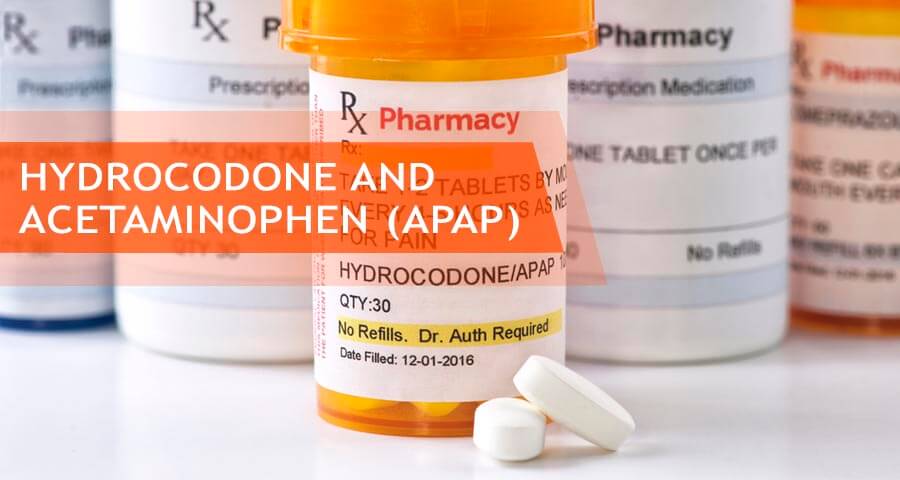
Hydrocodone is a synthetic opioid with strong analgesic properties. It is prescribed for prolonged, severe pain. It is available in its generic form and also under the brand name of Zohydro ER. It is often combined with other non-opioid products to make it more effective.
Table Of Contents:
The effects of combinations, such as hydrocodone acetaminophen, are more potent as compared to that of hydrocodone alone. As opioids have a high potential for developing tolerance and dependence leading to addiction, combinations with non-opioids have been found to reduce the adverse effects on health. They still have some side effects and dangers associated with them. For which, FDA has issued several warnings.
Hydrocodone Acetaminophen Overview
Acetaminophen and hydrocodone are two separate medications that are available as a combination drug for the treatment of moderate to moderately severe pain. Acetaminophen is used to treat pain and fever. It is not habit-forming even with prolonged use but can cause liver damage if consumed in large doses. Hydrocodone classification is a narcotic analgesic with a high potential for abuse and addiction. The two medicines together are highly effective in relieving pain, but the use of this combination is not without risk.

Hydrocodone acetaminophen is a medication available in tablet or solution form to be taken by mouth. It is available as a generic drug called hydrocodone bitartrate and acetaminophen.
It Is Also Available Under Brand Names Such As:
- Vicodin, Vicodin ES, and Vicodin HP
- Lortab
- Lorcet and Lorcet Plus
- Norco
- Hycet
- Zydone
- Maxidone
- Verdrocet
The combination drug is a prescription medication and a controlled substance. Doctors use it to treat moderate to moderately severe pain that cannot be controlled with other less potent medications. It is prescribed to people who need around-the-clock pain relief required with an opioid analgesic.
Hydrocodone Acetaminophen Side Effects
The combination of narcotic and non-narcotic analgesic medication can impair thinking and slow reactions. It can cause severe drowsiness and dizziness, leading to falls and accidents. That’s why it is a good idea to avoid driving, operating heavy machinery, or performing hazardous activities, such as climbing ladders until you know how the body will react to acetaminophen hydrocodone.
Acetaminophen hydrocodone contains a narcotic analgesic that has a high potential for abuse and addiction. This drug can be habit-forming even when used at prescribed doses.
Like most medications, this combination pain reliever is also associated with several adverse effects.
Some Of the Most Common Hydrocodone Acetaminophen Side Effects include:
- Drowsiness
- Dizziness or lightheadedness
- Nausea, vomiting, stomach pain
- Constipation
- Difficulty urinating
- Rash or itching
- Dry mouth
- Back pain
- Muscle tightening
- Ringing in the ears
- Difficult or painful urination
- Insomnia
- Uncontrollable shaking of some part of the body
- Foot or ankle swelling
To manage these hydrocodone/acetaminophen side effects, individuals who have been prescribed acetaminophen hydrocodone 5/325mg (or other dosages) should avoid getting up quickly to prevent dizziness. It is a good idea to eat a high fiber diet and stay well hydrated (unless otherwise instructed) to prevent constipation. Any rash that develops while on this medicine should be checked out by a healthcare provider. If any of the above symptoms persist for longer than one week, it is essential to consult a physician.
FDA and Other Warnings
The Food and Drug Administration (FDA) has issued a black box warning for hydrocodone acetaminophen to warn patients and doctors that the medicine is dangerous because:
- It is habit-forming and can lead to misuse, abuse, and addiction with an associated risk of overdose and death.
- It can slow down or stop breathing.
- It can be fatal if accidentally ingested by a child or by someone without a prescription.
- It can cause neonatal withdrawal syndrome in a newborn baby if used by a pregnant woman while expecting. These withdrawal symptoms can be life-threatening for the infant.
- It can interact with other medications and result in potentially lethal adverse effects.
- It can cause liver failure due to excessive doses of acetaminophen.
- It can result in deep sedation, coma, and death when used in combination with other CNS depressants such as alcohol or benzodiazepines.
Hydrocodone Homatropine
Hydrocodone homatropine is a narcotic anti-cough medicine. This is a combination medication used to treat dry cough in adults and children above age 6. It includes a centrally-acting opioid as well as homatropine to prevent narcotic overdose. The opioid in this combination acts directly on the brain to suppress the cough reflex.

Hydrocodone homatropine syrup for pain may be prescribed to lung cancer patients to treat both cough and pain. This narcotic cough suppressant is available only with a doctor’s prescription. In addition to the tablet form, the drug is also available as an oral syrup or solution. The generic name of the medication is hydrocodone and homatropine, and it is available under different brand names.
Its Brand Names Include:
- Hycodan
- Hydromide
- Hydromet
- Hydrotropine
- Hydropane
- Tussigon
Proper Administration of Hydromet
Prolonged use of opioids can lead to physical and mental dependence. If treatment is stopped suddenly, it can lead to symptoms of hydrocodone withdrawal. The onset of withdrawal symptoms will depend on how long homatropine and hydrocodone stay in the system. That’s why it is important to take Hycodan syrup or tablets exactly as directed by a physician. The drug may become habit-forming if an individual takes more medicine, takes it more often, or takes it longer than prescribed.
For the Correct Use Of the Medication, Keep in Mind:
- The tablet should be swallowed whole without being crushed, chewed, or broken.
- Take medicine with food – opioids on an empty stomach can cause gastrointestinal upset.
- The syrup should be measured with an appropriate measuring device (household spoons are not accurate dose measures).
- Do not double up after a missed dose. Skip the missed dose and continue on the regular schedule.
- Store the medication at room temperature, away from moisture, direct light, and heat. Do not freeze. Keep out of reach of children.
- Dispose of unused medication as directed by a healthcare professional.
The medicine comes in different doses and strengths. The following formulations include 5 mg of the opioid and 1.5 mg homatropine:
- Oral solution (5 mg/1.5 mg)/5 mL – Hydromet
- Syrup (1.5mg/5ml) – Hycodan
- Hydrocodone homatropine 5/1.5mg tab – Tussigon
Possible Adverse Effects of Hycodan
Like any medication, Hycodan has its adverse effects. They will combine the effects of hydrocodone and homatropine (active components in the drug).
Side Effects Of Hydrocodone Homatropine Syrup Include:
- Drowsiness and lethargy
- Palpitations and heart rhythm abnormalities
- Dry mouth
- Agitation
- Dizziness
- Flushing, sweating, itching
- Constipation, nausea, vomiting
- Seizures
- Respiratory arrest or cardiac arrest
- Eczema
- Follicular conjunctivitis
- Irregular breathing (fast or slow)
- Shallow breathing
- Blue lips, skin, or fingernails
- Decreased urination (volume or frequency)
- Pain or difficulty with urination (dribbling)
Warnings and Precautions
There is a risk of fatal adverse effects if this combination medicine of homatropine and hydrocodone is taken with alcohol or other drugs that slow breathing or cause drowsiness. This risk is highest in children and people who use the medication without a prescription.
Some Of the Precautions While Taking Hycodan Include:
- Do not drive or perform hazardous activities (operate heavy machinery, climb ladders) until the effect of the medicine is known.
- Avoid taking while pregnant or breastfeeding to prevent opioid dependence in the baby.
- The medicine is not approved for use in children under age 6.
- Seek immediate medical attention in case of shallow breathing, extreme drowsiness, or profound weakness.
Chlorpheniramine Hydrocodone
Chlorpheniramine hydrocodone is a combination of an antihistamine and a centrally-acting narcotic antitussive. The antihistamine component of the drug, chlorpheniramine, reduces the effects of histamine, a naturally occurring chemical in the body that causes symptoms such as itching, sneezing, runny nose, and watery eyes. The opioid component acts directly on the brain to suppress a cough.
Misuse of hydrocodone chlorpheniramine susp or tablets can lead to addiction with a risk of overdose and death.
This combination is used to treat upper respiratory symptoms associated with the flu, common cold, and allergies. It is worth noting that this medicine is different from hydrocodone acetaminophen, which is a pain reliever.
The generic name of the combination is hydrocodone and chlorpheniramine.
It Is Also Available Under Various Brand Names, Including:
- Tussionex
- Tussionex PennKinetic
- TussiCaps
- S-T Forte 2
The medication comes in tablet form as well as liquid hydrocodone extended-release suspension. The combination of chlorpheniramine with an opioid is available by prescription only and is not recommended for children under 6 or nursing mothers.
Dangers and Side Effects
Misuse of hydrocodone chlorpheniramine suspension or tablets can be habit-forming and can cause overdose and death, especially in children or adults who use it without a doctor’s orders.
Common Side Effects Are:
- Dizziness or lightheadedness
- Drowsiness
- Trouble focusing
- Anxiety and mood changes
- Constipation
- Blurred vision
- Nausea, vomiting, loss of appetite
- Dry mouth
- Rash or itching
- Sweating
- Impaired coordination
Warnings and Precautions for Hydrocodone-Chlorpheniramine
The Food and Drug Administration (FDA) has issued a boxed warning for hydrocodone/chlorpheniramine er suspension (Tussionex PennKinetic) and other formulations of this medicine.
The Warnings Include:
- Concomitant use of this medication with benzodiazepines, alcohol, and other CNS stimulants can cause respiratory depression, profound sedation, coma, and death.
- Because of the opioid in it, chlorpheniramine hydrocodone is habit-forming with a risk of addiction and fatal overdose.
- Use during pregnancy can cause withdrawal symptoms in the newborn baby.
- It has dangerous interactions with other medications.
Prescription opioids are used to treat pain, and in combination with chlorpheniramine, they are prescribed to control a cough. However, these drugs are narcotics with a high potential for abuse and addiction even when used strictly per doctor’s orders.
Hydrocodone / Ibuprofen
Ibuprofen belongs to the class NSAIDs (non-steroidal anti-inflammatory drugs). It is used for pain, inflammation, and fever. It starts acting within 30 mins and has a half-life of 2-4 hours. Hydrocodone / ibuprofen combination is used for acute postoperative pain. It is not prescribed for longer periods, i.e., more than 10 days. The combination was first introduced as a fixed-dose medicine with 7.5 mg of hydrocodone and 200 mg of ibuprofen. The combined effect of hydrocodone and ibuprofen is synergistic, i.e., they amplify one another’s effects. This combination is effective in comparison with other pain relief medications.
Hydrocodone / Ibuprofen Is Available With the Following Brand Names:
- Reprexain
- Vicoprofen
- Ibudone
Dangers and Side Effects
Both hydrocodone and ibuprofen have their own side effects. Apart from the risks associated with opioids, the hydrocodone / ibuprofen combination contains ibuprofen, an NSAID. NSAIDs are advised to be avoided as they increase the risk of heart attacks, bleeding, and ulcers.

Patients with asthma, liver, kidney, pancreas, gallbladder, thyroid, or any other problem are advised to inform their healthcare providers before taking these medications. They should also take time to go through detailed information on drug labels by FDA.
The Side Effects Include:
- Constipation
- Heartburn
- Nausea
- Vomiting
- Tiredness
- Heart Attack
- Heart Failure
- Liver Problems Including Liver Failure
- Kidney Problems Including Kidney Failure
- Bleeding And Ulcers In The Stomach And Intestine
- Anxiety
- Flatulence
- Urinary Retention
- Weakness
To avoid these adverse effects or minimize them, it is important to inform your healthcare provider about any pre-existing condition, any allergy, or any other prescription or over the counter medication you are using.
Warnings and Precautions
This combination has been known to cause many adverse effects on health, leading to coma and even death. This is why the FDA has issued several warnings for this combination drug.
- This combination drug has an addiction, abuse, and misuse potential due to the opioid component. The pros and cons should be weighed before prescribing it for patients prone to this risk.
- Use of this medication, especially in the beginning or increasing dosage, can cause serious respiratory depression, which may even lead to fatal consequences.
- If ingested by accident, especially by children, even a single dosage can lead to fatal consequences.
- If pregnant women use opioids for a prolonged time during pregnancy, neonates born in these pregnancies are at high risk of neonatal opioid withdrawal syndrome. If the use of an opioid is unavoidable during pregnancy, the mothers should be warned, and treatment options should be discussed and provided promptly.
- Concomitant use of cytochrome P450 3A4 inhibitors or inducers can interfere with the metabolism of hydrocodone. This should be monitored, and appropriate care provided.
- Concomitant use of this combination drug with benzodiazepines or other CNS depressants should be avoided until no alternative is available and the use of both drugs is a medical necessity. This interaction can cause excessive sedation, respiratory depression, coma, and even death.
- The use of this drug is contraindicated with a coronary artery bypass graft.
- NSAIDs such as ibuprofen increase the risk of serious cardiovascular thrombotic events, including stroke, myocardial infarction, and others.
- The use of NSAIDs can increase the risk of serious gastrointestinal adverse events such as bleeding, perforation, and ulceration in the stomach or intestines without any prior signs of warning.
If one is among risk groups such as pregnant, has a history of heart conditions, asthma, or any other medical condition mentioned above, it is necessary to inform the doctor to prescribe the correct medication while weighing the cons and pros of the condition risks.
Avoiding Dangers While Using Combination Products
Every drug has its own side effects, but the effects of combination drugs can be even more complicated and severe sometimes. Opioids such as Hydrocodone can have the potential for dependency and severe side effects even in combination with other drugs and smaller quantities. An overdose of opioid cough suppressants can result in a fatal respiratory or cardiac arrest. Besides, the misuse of prescription opioids is a risk factor for starting the use of street drugs such as heroin. Treatment for opioid abuse is available at drug rehab facilities around the country. There are many drug addiction treatment options for individuals addicted to hydrocodone acetaminophen 7.5-325 or other formulations of the medication. If one has an addiction to hydrocodone acetaminophen, help is provided with Naloxone, Methadone, and other medications to make the process safe and easy for addicted individuals.
Hope Without Commitment
Find the best treatment options. Call our free and confidential helpline
Most private insurances accepted
Find Drug Rehabilitation Centers Near You Anywhere In the US
Addiction Resource team has compiled an extensive list of the top drug rehabilitation facilities around the country. Use our locator tool to find the best centers near you.
Page Sources
- FDA Drug Safety Communication: Prescription Acetaminophen Products to be Limited to 325 mg Per Dosage Unit; Boxed Warning Will Highlight Potential for Severe Liver Failure, 2018. https://www.fda.gov/drugs/drug-safety-and-availability/fda-drug-safety-communication-prescription-acetaminophen-products-be-limited-325-mg-dosage-unit
- FDA, Hycodan label, 2008. https://www.accessdata.fda.gov/drugsatfda_docs/label/2009/005213s037lbl.pdf
- Dailymed, Hydromet - hydrocodone bitartrate and homatropine methylbromide solution https://dailymed.nlm.nih.gov/dailymed/drugInfo.cfm?setid=a324c912-a3ef-4296-b9a8-b0fec687eb06
- Victor S. Sloan, Alphia Jones, Chidi Maduka, and Jürgen W. G. Bentz, A Benefit Risk Review of Pediatric Use of Hydrocodone/Chlorpheniramine, a Prescription Opioid Antitussive Agent for the Treatment of Cough, 2019. https://www.ncbi.nlm.nih.gov/pmc/articles/PMC6520422/
- Li JX. Combining opioids and non-opioids for pain management: current status. Neuropharmacology. 2019. https://pubmed.ncbi.nlm.nih.gov/31029588/
- Holtsman M, Hale C. Opioids used for mild to moderate pain. In Essentials of Pain Medicine 2018 Jan 1 (pp. 385-388). Elsevier. https://www.sciencedirect.com/science/article/pii/B9780323401968000437
- Desai C. Meyler's side effects of drugs: The international encyclopedia of adverse drug reactions and interactions. Indian Journal of Pharmacology. 2016 Mar;48(2):224. https://www.sciencedirect.com/science/article/pii/B9780444537171008660
- ASHP. Hydrocodone Combination Products. 2021. https://medlineplus.gov/druginfo/meds/a601006.html
- Stanos SP, Tyburski MD, Parikh SS. Minor and short-acting analgesics, including opioid combination products. InPractical management of pain 2014 Jan 1 (pp. 508-529). Mosby. https://www.sciencedirect.com/science/article/pii/B9780323083409000372
- Dailymed. VICOPROFEN- hydrocodone bitartrate and ibuprofen tablet, coated. 2011. https://dailymed.nlm.nih.gov/dailymed/drugInfo.cfm?setid=f914699b-12a7-44f1-846f-e6437a16e35d
- Poly Pharmaceuticals. IBUDONE- hydrocodone bitartrate and ibuprofen tablet, film coated. 2019. https://dailymed.nlm.nih.gov/dailymed/medguide.cfm?setid=73bcc732-5215-475a-9d59-4c11abf8bf17
- ASHP. Ibuprofen. 2020. https://medlineplus.gov/druginfo/meds/a682159.html#why
- FDA. Vicoprofen. 2016. https://www.accessdata.fda.gov/drugsatfda_docs/label/2016/020716s012s013s014s015s016lbl.pdf
- Palangio M, Wideman GL, Keffer M, Landau CJ, Morns E, Doyle Jr RT, Jiang JG, Damask M, de Padova A. Combination hydrocodone and ibuprofen versus combination oxycodone and acetaminophen in the treatment of postoperative obstetric or gynecologic pain. Clinical therapeutics. 2000 May 1;22(5):600-12. https://pubmed.ncbi.nlm.nih.gov/10868557/
- Chang AK, Bijur PE, Munjal KG, John Gallagher E., Randomized clinical trial of hydrocodone/acetaminophen versus codeine/acetaminophen in the treatment of acute extremity pain after emergency department discharge, https://www.ncbi.nlm.nih.gov/pubmed/24628747
- Rodriguez RF, Castillo JM, Del Pilar Castillo M, Nuñez PD, Rodriguez MF, Restrepo JM, Rodriguez JM, Ortiz Y, Angel AM, Codeine/acetaminophen and hydrocodone/acetaminophen combination tablets for the management of chronic cancer pain in adults: a 23-day, prospective, double-blind, randomized, parallel-group study, https://www.ncbi.nlm.nih.gov/pubmed/17617281


 Reviewed by:
Reviewed by:  Written by:
Written by: 

 FindTreatment.gov
FindTreatment.gov